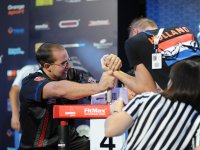I remember my first tournament not because I won. My most vivid memory is a loud crack – one of the contestants’ arm breaking. For the longest time we tried to find out who’s fault was that, the referee’s or the contestant’s.
The contestant was the first to try and explain what happened. Injuries happen to both professionals and amateurs. Local events often draw people who don’t know anything about the rules of armwrestling. They step up to the table without realizing the potential threat they pose to others. For example, recently we witnessed a competition for various uniformed formations (policemen, ambulance workers, etc.). Our coach, who refereed the competition, was terrified. The contestants, most of them huge men, paid no attention to the referee’s commands! The tables were all over the place, and when the referee tried to step in, the contestants just got angry with him. He could do nothing to change the situation. But there is also another side to this – the referee’s qualifications.
It is hard to calculate the exact amount of injuries caused by referees’ incompetence. One could risk a 50 / 50 assessment. It is logical, that the higher the referee’s qualifications, the more they take care of contestants.
Let’s take Poland for example. In our system, there are three categories : A, B and C. C category allows only side refereeing. B category gets one a main place by the table. B category referees can also be main refs at local tournaments. A category is the top one. It’s compulsory with the higg level events for the contestants, refs and organizers to all have insurance. Why is that ?
In 2000 we were organizing a local event – recalls Igor Mazurenko. – Many of the people starting in the competition had no idea of the rules of armwrestling. They were just strong guys who didn’t care about technique. The referees were also just a bunch of people, who only had a general idea of the rules. Three people suffered a broken arm, out of 40 contestants, that’s almost 10% ! One of the injured was a soldier. He showed up for the competition to make some money. When we called his command to inquire about insurance, it turned out he had none. The guy lost his job immediately. Since that time we made insurance compulsory.
In 2003 – 2003 a rule of qualification was imposed. There are seminars 6 – 7 times a year for any referees who want to be qualified. One of frequent guests of the Polish Federation is David Shedd. In 2004 David visited the Ukrainian Championship, which took place in Theodosia. He never visited Ukraine and he wanted to check out the level of refereeing there. He did not receive a warm welcome. It took a lot of explaining about the compulsory attention of a European Federation main referee at various events, before the Ukrainians agreed for him to be there.
Despite the agreement, the organizers were not very forthcoming – the British referee was not provided with an interpreter. After Shedd’s seminar and the tournament, it turned out that the Ukrainian team fought by a different set of rules. The blame was placed with Shedd himself! A similar situation happened in Russia at that time. The referee gave three warnings to a contestant, instead of two. Currently the level of refereeing in Russia and Ukraine is at an acceptable level, but to this day this form of seminar work has zero interest. Such cases make one realize that a referee needs to constantly educate themselves and upgrade their skills.
The main cause of injury is still the human factor. It’s not possible at this moment to place the guilt with the referee or the contestant. There is however hope that future will change that.
Anastazja Kisiliewa

